
Richard Steven Valenzuela, better known by his stage name Ritchie Valens, was an American guitarist, singer and songwriter. A rock and roll pioneer and a forefather of the Chicano rock movement, Valens died in a plane crash just eight months after his breakthrough.
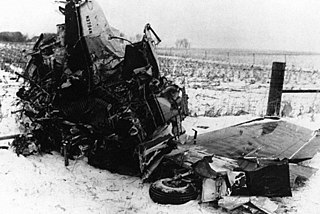
On February 3, 1959, American rock and roll musicians Buddy Holly, Ritchie Valens, and "The Big Bopper" J. P. Richardson were all killed in a plane crash near Clear Lake, Iowa, together with pilot Roger Peterson. The event became known as "The Day the Music Died" after singer-songwriter Don McLean referred to it as such in his 1971 song "American Pie".

Douglas Glenn Colvin, better known by his stage name Dee Dee Ramone, was an American musician. He was the bassist and a founding member of the punk rock band the Ramones. Throughout the band's existence, he was the most prolific lyricist and composer, writing many of their best-known songs, such as "53rd & 3rd", "Chinese Rock", "Commando", "Wart Hog", "Rockaway Beach", "Poison Heart" and "Bonzo Goes To Bitburg". The latter won the New York Music Award for best independent single of the year in 1986, while Animal Boy, which the song is from, won for best album.
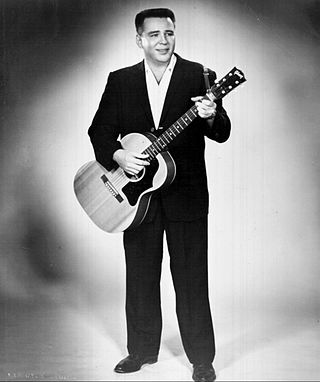
Jiles PerryRichardson Jr., better known by his stage name The Big Bopper, was an American musician and disc jockey. His best-known compositions include "Chantilly Lace," "Running Bear", and "White Lightning", the latter of which became George Jones's first number-one hit in 1959.
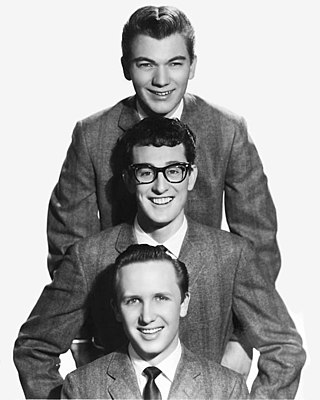
The Crickets were an American rock and roll band from Lubbock, Texas, formed by singer-songwriter Buddy Holly in January 1957. Their first hit record, "That'll Be the Day", released in May 1957, peaked at number three on the Billboard Top 100 chart on September 16, 1957. The sleeve of their first album, The "Chirping" Crickets, shows the band line-up at the time: Holly on lead vocals and lead guitar, Niki Sullivan on rhythm guitar, Jerry Allison on drums, and Joe B. Mauldin on bass. The Crickets helped set the template for subsequent rock bands, such as the Beatles, with their guitar-bass-drums line-up, performing their own material. After Holly's death in 1959, the band continued to tour and record into the 1960s and beyond with other band members through to the 21st century.

Ray Edward Cochran, known professionally as Eddie Cochran, was an American rock and roll musician. His songs, such as "Twenty Flight Rock", "Summertime Blues", "C'mon Everybody" and "Somethin' Else", captured teenage frustration and desire in the mid-1950s and early 1960s. Cochran experimented with multitrack recording, distortion techniques, and overdubbing, even on his earliest singles. Cochran played the guitar, piano, bass, and drums. His image as a sharply dressed and attractive young man with a rebellious attitude epitomized the stance of the 1950s rocker, and in death, Cochran achieved iconic status.

Tribute is a live album by British heavy metal singer Ozzy Osbourne, featuring his work with hard rock guitarist Randy Rhoads, in whose honor the album was released. The album was released in April 1987 in the US and May 1987 in the UK, five years after the death of Rhoads, then it was reissued on 22 August 1995, and again remastered and reissued in 2002. It peaked at number 6 on the US Billboard 200 chart.
"Mack the Knife" or "The Ballad of Mack the Knife" is a song composed by Kurt Weill with lyrics by Bertolt Brecht for their 1928 music drama The Threepenny Opera. The song tells of a knife-wielding criminal of the London underworld from the musical named Macheath, the "Mack the Knife" of the title.

Sharon Kathleen Sheeley was an American songwriter who wrote songs for Glen Campbell, Ricky Nelson, Brenda Lee, and Eddie Cochran.

"Summertime Blues" is a song co-written and recorded by American rock artist Eddie Cochran. It was written by Cochran and his manager Jerry Capehart. Originally a single B-side, it was released in August 1958 and peaked at number 8 on the Billboard Hot 100 on September 29, 1958, and number 18 on the UK Singles Chart. It has been covered by many artists, including being a number-one hit for country music artist Alan Jackson, and scoring notable hits in versions by Blue Cheer, the Who and Brian Setzer, the last of whom recorded his version for the 1987 film La Bamba, in which he portrayed Cochran.

Garland Perry "Hank" Cochran was an American country music singer and songwriter. Starting during the 1960s, Cochran was a prolific songwriter in the genre, including major hits by Patsy Cline, Ray Price, Eddy Arnold, and others. Cochran was also a recording artist between 1962 and 1980, scoring seven times on the Billboard country music charts, with his greatest solo success being the No. 20 "Sally Was a Good Old Girl." In 2014, he was inducted into the Country Music Hall of Fame.

Harold Franklin "Hawkshaw" Hawkins was an American country music singer popular from the 1950s into the early 1960s. He was known for his rich, smooth vocals and music drawn from blues, boogie and honky tonk. At 6 feet 5 inches (1.96 m) tall, Hawkins had an imposing stage presence, and he dressed more conservatively than some other male country singers. Hawkins died in the 1963 plane crash that also killed country stars Patsy Cline and Cowboy Copas. He was a member of the Grand Ole Opry and was married to country star Jean Shepard.
Colonial Records was a Chapel Hill, North Carolina–based record label that provided the springboard for artists Andy Griffith, George Hamilton IV, John D. Loudermilk, and Billy "Crash" Craddock.
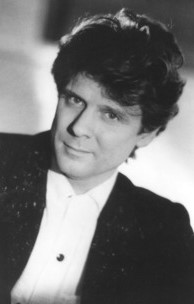
Walter Hyatt was an American singer and songwriter. His group, Uncle Walt's Band, was involved in the alternative music scene in Austin, Texas.

"Ride a White Swan" is a song by English band T. Rex. It was released as a stand-alone single on 9 October 1970 by record label Fly, and was the first single credited under the band's new, shorter name. Like all of the band's songs, it was written by the group's singer, guitarist and founder Marc Bolan. The song was included on the US version of the 1970 album, T. Rex.
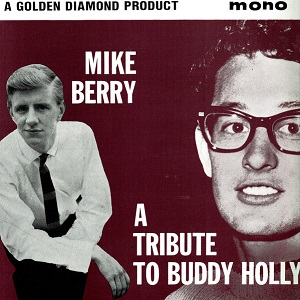
"Tribute to Buddy Holly" is a song written by Geoff Goddard, first recorded by Mike Berry and the Outlaws as a single, which was released in September 1961 on His Master's Voice records. His first chart success, it reached number 24 on the UK Singles Chart in November 1961. The song was banned by the BBC for being too "morbid", regarding the death of 1950s rock and roll singer Buddy Holly, who died in a plane crash on 3 February 1959.

"Just Like Eddie" is a song by recording artist Heinz. The song was his second solo release after leaving the band The Tornados.

The Ramones were an American punk rock band formed in the New York City neighborhood Forest Hills, Queens in 1974. Known for helping establish the punk movement in the United States and elsewhere, the Ramones are often cited as the first true punk rock band. Although they had never achieved significant commercial success, the band is seen today as highly influential in punk culture.
Crest Records was a subsidiary record label of music publisher American Music owned by Sylvester Cross.
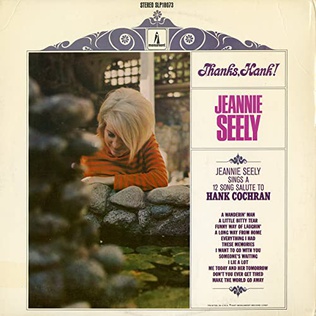
Thanks, Hank! is a studio album by American country artist Jeannie Seely. It was released in May 1967, by Monument Records and was produced by Fred Foster. The album contained songs written entirely by songwriter Hank Cochran, some of which were cover tunes while others were new tracks. Among the new tracks were two singles: the top 20 country song "A Wanderin' Man" and the charting song "These Memories". The LP also made the top 20 of the US country chart. The album received reviews from AllMusic, Cash Box and Record World following its release.
















